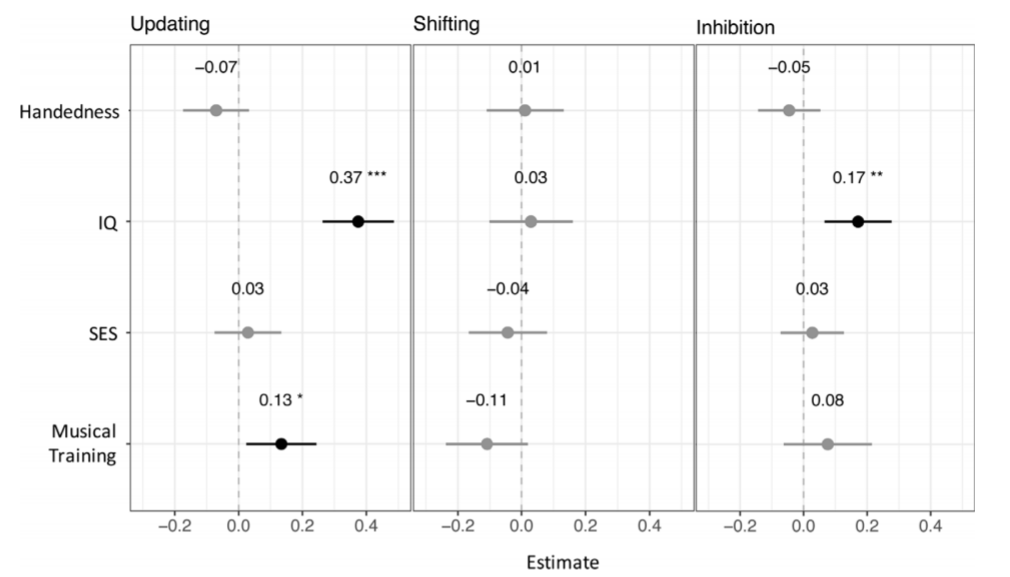Musical training encompasses a broad range of skills, which likely rely on a similarly large range of cognitive abilities. Consider the act of sight-reading, in which a musician plays from a piece of sheet music they have never seen before. The musician must read the upcoming notes (a feat of translating visual information into a motor program that is dependent on the instrument being played) store those notes in the correct order (a feat of working memory capacity), and then update the notes in real-time as they are played.
This video shows pianist Yuri Rusakov sight-reading:
Of course, not all musicians (even trained ones) can sight-read. Some can improvise; or conduct; or compose; or critique. Each of these tasks requires a distinct set of cognitive abilities to perform, and each is relatively unique to the act of performing music. We have discussed the cognition of music on this blog a number of times.
Although the so-called “Mozart effect” (the claim that listening to music has a beneficial effect on cognition) has not been supported by scientific evidence, there is large body of evidence linking musical training to cognitive abilities. And we have discussed executive-function training on this site before, detailing how video games might promote one cognitive ability (task switching). Could musical training boost cognitive abilities more generally?
A link between musical training and cognitive improvement would be important, not just to provide additional incentives for musical training at all stages of life, but also to show that the underlying cognitive abilities are themselves malleable (rather than only showing improvement on music-specific tasks).
In other words, could you become smarter just by learning to play music?
Before a musical training intervention should be undertaken, a good first step is to determine whether a correlation exists between musical ability and cognitive abilities. A recent study published in Memory & Cognition by Brooke Okada and Robert Slevc set out to look  for a correlation between aspects of musical ability and aspects of cognition. In particular, Okada and Slevc evaluated the correlations between musical ability with types of cognitive abilities called executive functions. These functions include generic abilities like monitoring sensory information, switching between tasks, and refraining from responding.
for a correlation between aspects of musical ability and aspects of cognition. In particular, Okada and Slevc evaluated the correlations between musical ability with types of cognitive abilities called executive functions. These functions include generic abilities like monitoring sensory information, switching between tasks, and refraining from responding.
As Okada and Slevc point out, the message of the literature relating musical ability to cognition is mixed. These mixed results could have come about for several reasons. The relation between musical training and cognitive ability could be small or weak. Another possibility is that musical training and the general cognitive abilities were not measured very well or very reliably. Finally, musical ability and good executive functions could both coincide with some third factor, such as high socioeconomic status or a high IQ.
To address some of these issues, Okada and Slevc conducted a large correlational study in which 150 undergraduate students completed a battery of executive function tasks and a comprehensive musical ability questionnaire. The nine executive function tasks were divided into three types – shifting, inhibiting, and updating.
Inhibiting tasks measure a person’s ability to refrain from making a response. For example, imagine remembering to keep a surprise party secret from someone. You have to remember that this person doesn’t know about the surprise, whereas everyone else going to the party does know about it.
Updating tasks measure a person’s ability to maintain and update information held in working memory. For example, imagine repeating what someone is saying in real time. You have to hold the previous few words in memory while saying the next word in the sequence.
Finally, shifting tasks measure a person’s ability to dynamically switch between tasks. Typically, switching tasks always incurs a cost. (This is why you should never text and drive, even if you think you can do so successfully.)
The approach of using multiple measures for the same executive function allows the researchers to use a latent variable analysis. This approach is also an improvement on previous studies that looked at the intersection of musical ability and executive functions. Think of latent variable analysis like a psychological Venn Diagram. Task A might require inhibition, plus a little working memory updating, and reading skills. Task B also requires inhibition, but also motor skills and perceptual discrimination. Combining scores on Task A and B will get us closer to how good that person is at inhibiting, because the other task does not include the irrelevant constructs.
To measure musical abilities, Okada and Slevc used a self-report measure that captures several aspects of music experience, ability, and attitude. The researchers were predominantly interested in musical experience and music training – the duration and intensity of musical training throughout the participant’s lifespan. Importantly, the researchers also collected data on IQ and socioeconomic status and controlled for those variables in their main analyses.
Overall, Okada and Slevc found no correlation between the amount of musical training a person has and executive function overall. However, they did find a correlation specifically between updating and musical training. The overall pattern of effects is shown in the figure below:

Unsurprisingly, IQ predicts two of the facets of executive control (updating and inhibition). Musical training exhibited a modest association with updating only.
The large sample size, use of latent variable analysis, and incorporation of covariates make this result an important one in the context of establishing a relation between musical ability and cognitive function.
These results highlight the variability in both executive function tasks and in musical abilities. No two tasks in either context are the same, and mapping one to the other is fraught with difficulty. Still, the promise of this area of research – providing cognitive-function training through musical instruction – makes it worth detailing just how musical abilities relate to cognition. Based on the current study, a fruitful line of future research might try to train sight-reading (or some other musical task) in novice musicians and look for gains specifically on updating tasks.
But this study makes clear that mapping a specific musical task onto a specific cognitive ability (or set of abilities) is paramount.
Reference for the article discussed in this post:
Okada, B. M., & Slevc, L. R. (2018). Individual differences in musical training and executive functions: a latent variable approach. Memory & Cognition, 46(7), 1076-1092. DOI:10.3758/s13421-018-0822-8.
